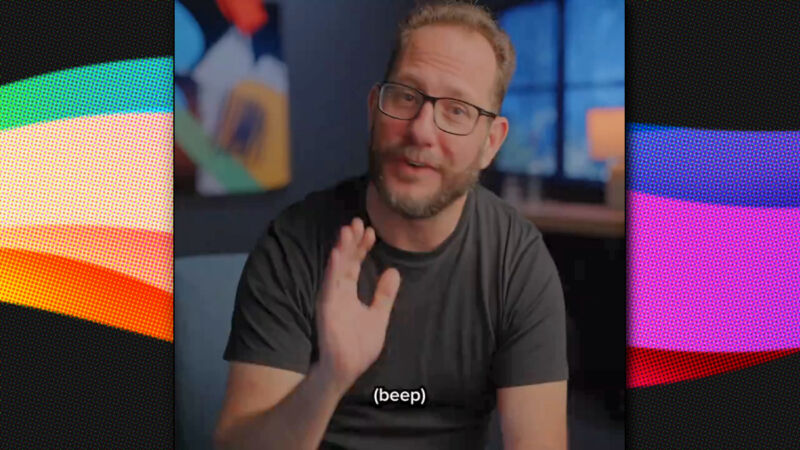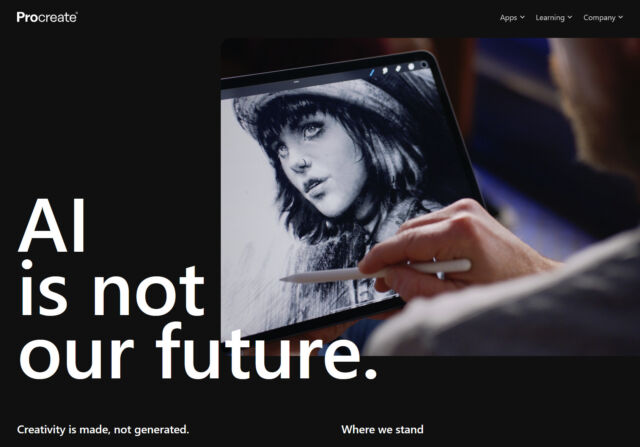
Enlarge / Still of Procreate CEO James Cuda from a video posted to X.
On Sunday, Procreate announced that it will not incorporate generative AI into its popular iPad illustration app. The decision comes in response to an ongoing backlash from some parts of the art community, which has raised concerns about the ethical implications and potential consequences of AI use in creative industries.
“Generative AI is ripping the humanity out of things,” Procreate wrote on its website. “Built on a foundation of theft, the technology is steering us toward a barren future.”
In a video posted on X, Procreate CEO James Cuda laid out his company’s stance, saying, “We’re not going to be introducing any generative AI into our products. I don’t like what’s happening to the industry, and I don’t like what it’s doing to artists.”
Cuda’s sentiment echoes the fears of some digital artists who feel that AI image synthesis models, often trained on content without consent or compensation, threaten their livelihood and the authenticity of creative work. That’s not a universal sentiment among artists, but AI image synthesis is often a deeply divisive subject on social media, with some taking starkly polarized positions on the topic.
Procreate CEO James Cuda lays out his argument against generative AI in a video posted to X.
Cuda’s video plays on that polarization with clear messaging against generative AI. His statement reads as follows:
You’ve been asking us about AI. You know, I usually don’t like getting in front of the camera. I prefer that our products speak for themselves. I really fucking hate generative AI. I don’t like what’s happening in the industry and I don’t like what it’s doing to artists. We’re not going to be introducing any generative AI into out products. Our products are always designed and developed with the idea that a human will be creating something. You know, we don’t exactly know where this story’s gonna go or how it ends, but we believe that we’re on the right path supporting human creativity.
The debate over generative AI has intensified among some outspoken artists as more companies integrate these tools into their products. Dominant illustration software provider Adobe has tried to avoid ethical concerns by training its Firefly AI models on licensed or public domain content, but some artists have remained skeptical. Adobe Photoshop currently includes a “Generative Fill” feature powered by image synthesis, and the company is also experimenting with video synthesis models.
The backlash against image and video synthesis is not solely focused on creative app developers. Hardware manufacturer Wacom and game publisher Wizards of the Coast have faced criticism and issued apologies after using AI-generated content in their products. Toys “R” Us also faced a negative reaction after debuting an AI-generated commercial. Companies are still grappling with balancing the potential benefits of generative AI with the ethical concerns it raises.
Artists and critics react

Enlarge / A partial screenshot of Procreate’s AI website captured on August 20, 2024.
So far, Procreate’s anti-AI announcement has been met with a largely positive reaction in replies to its social media post. In a widely liked comment, artist Freya Holmér wrote on X, “this is very appreciated, thank you.”
Some of the more outspoken opponents of image synthesis also replied favorably to Procreate’s move. Karla Ortiz, who is a plaintiff in a lawsuit against AI image-generator companies, replied to Procreate’s video on X, “Whatever you need at any time, know I’m here!! Artists support each other, and also support those who allow us to continue doing what we do! So thank you for all you all do and so excited to see what the team does next!”
Artist RJ Palmer, who stoked the first major wave of AI art backlash with a viral tweet in 2022, also replied to Cuda’s video statement, saying, “Now thats the way to send a message. Now if only you guys could get a full power competitor to [Photoshop] on desktop with plugin support. Until someone can build a real competitor to high level [Photoshop] use, I’m stuck with it.”
A few pro-AI users also replied to the X post, including AI-augmented artist Claire Silver, who uses generative AI as an accessibility tool. She wrote on X, “Most of my early work is made with a combination of AI and Procreate. 7 years ago, before text to image was really even a thing. I loved procreate because it used tech to boost accessibility. Like AI, it augmented trad skill to allow more people to create. No rules, only tools.”
Since AI image synthesis continues to be a highly charged subject among some artists, reaffirming support for human-centric creativity could be an effective differentiated marketing move for Procreate, which currently plays underdog to creativity app giant Adobe. While some may prefer to use AI tools, in an (ideally healthy) app ecosystem with personal choice in illustration apps, people can follow their conscience.
Procreate’s anti-AI stance is slightly risky because it might also polarize part of its user base—and if the company changes its mind about including generative AI in the future, it will have to walk back its pledge. But for now, Procreate is confident in its decision: “In this technological rush, this might make us an exception or seem at risk of being left behind,” Procreate wrote. “But we see this road less traveled as the more exciting and fruitful one for our community.”